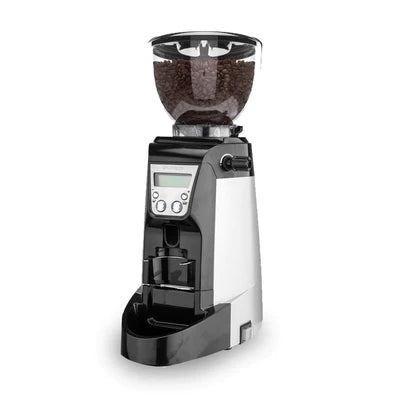Industrial Coffee Grinder: Cost, Quality, and Performance Explored
Industrial Coffee Grinder: Cost, Quality, and Performance Explored
Blog Article
Industrial Coffee Grinder Guide: Boost Efficiency and Quality
In the affordable landscape of coffee production, selecting the best commercial coffee grinder plays an essential function in improving both performance and item quality. Understanding the subtleties of various grinder types and essential functions-- such as personalized work setups and durable building and construction-- can considerably affect the last taste profile of the coffee. In addition, the optimization of the grinding process, paired with diligent upkeep, is important for maintaining performance with time. As we discover these crucial aspects, it becomes obvious that the effects expand past plain devices selection, impacting overall service success in ways that require closer exam.
Understanding Mill Types
When selecting an industrial coffee grinder, comprehending the various types offered is important for optimizing both flavor extraction and functional performance. The two key sorts of mills are blade grinders and burr mills. Blade mills use sharp blades that slice coffee beans right into irregular dimensions, leading to irregular extraction and potentially undesirable tastes. While blade mills are often a lot more cost effective and suitable for small-scale procedures, they are generally not advised for commercial use.

Inevitably, picking the best sort of mill is important to preserving quality and efficiency in coffee manufacturing, making it crucial for organizations to invest in high-grade burr mills for optimal outcomes.
Secret Features to Take Into Consideration
Picking an industrial coffee mill calls for careful consideration of a number of essential attributes that can substantially affect both efficiency and the general coffee experience. One of the key facets to assess is the grinding mechanism. Burr grinders are typically preferred over blade mills, as they give a regular grind dimension, which is important for optimal removal and taste.
One more crucial attribute is the mill's ability. Relying on the volume of coffee you need to process, pick a design that can handle your needs without compromising speed or high quality. Additionally, think about the grind settings supplied. A functional grinder with several settings enables you to tailor the grind dimension to different developing approaches, boosting the coffee's taste profile.
Examine the mill's sound degree, particularly in a busy coffee shop or manufacturing setting, where too much noise can be disruptive. Investing in a grinder that stabilizes these features can greatly boost both operational performance and the quality of the coffee offered.
Optimizing Grinding Refine
To achieve the best results in coffee preparation, enhancing the grinding process is vital. The grind dimension dramatically affects extraction, taste, and overall high quality of the made coffee.


In addition, checking the grinding rate can enhance the process. Slower grinding commonly creates much less warmth, maintaining fragile tastes and aromas. Alternatively, quicker grinding may produce excessive warmth, negatively impacting the coffee's high quality.
Maintenance and Care Tips
Appropriate upkeep and care of industrial coffee mills are crucial for ensuring optimal efficiency and long life. Normal cleaning is the structure of maintenance; deposit buildup can affect flavor and grinding effectiveness. It is advisable to cleanse the grinder after each usage, wiping down the exterior and eliminating any kind of coffee premises from the burrs.
Furthermore, check the grinding burrs for wear and tear. Plain burrs can endanger work consistency, so they need to be changed as needed. Industrial Coffee Grinder. Regularly calibrating the mill is also vital, as this preserves the desired grind size for different developing techniques
Lubrication of moving components need to be done according to the maker's specs, as this decreases rubbing and extends the life of the tools. It is necessary to utilize food-grade lubricants to make sure safety and conformity with health laws.
Finally, maintain the grinder in a secure and dry atmosphere to stop corrosion and deterioration. By adhering to these upkeep and care ideas, drivers can link improve the performance of their industrial coffee mills while ensuring high-grade output and prolonged functional life.
Roi Evaluation
Reviewing the roi (ROI) for industrial coffee grinders is vital for businesses seeking to optimize their coffee production abilities. A thorough ROI analysis helps identify the monetary feasibility of purchasing high-grade mills, allowing businesses to weigh the initial expenses against prospective gains.
Examine the purchase price of the mill, including installment and any kind of required modifications to existing framework. High-performance grinders often lead to lowered grinding time and boosted throughput, which can considerably boost efficiency.
Additionally, take into consideration the effect on product top quality. Industrial Coffee Grinder. Superior grinders generate a more constant grind dimension, which can improve taste accounts and client complete satisfaction, ultimately driving sales. By boosting the quality of the end product, companies can warrant higher rates, leading to boosted revenue
Final Thought
In summary, an industrial coffee grinder plays a pivotal role in enhancing both efficiency and product top quality within coffee manufacturing. Inevitably, the tactical investment in a dependable check my source grinder adds significantly to boosted profits and competition in the coffee market.
In the competitive landscape of coffee production, selecting the appropriate commercial coffee mill plays a pivotal role in enhancing both performance and product top quality. The 2 primary types index of grinders are blade mills and burr grinders. Within the burr grinder category, there are level burr grinders and conical burr mills, each with its benefits. Burr grinders are generally favored over blade grinders, as they provide a regular work size, which is important for optimal extraction and flavor.
In summary, a commercial coffee mill plays a critical role in boosting both efficiency and product top quality within coffee manufacturing.
Report this page